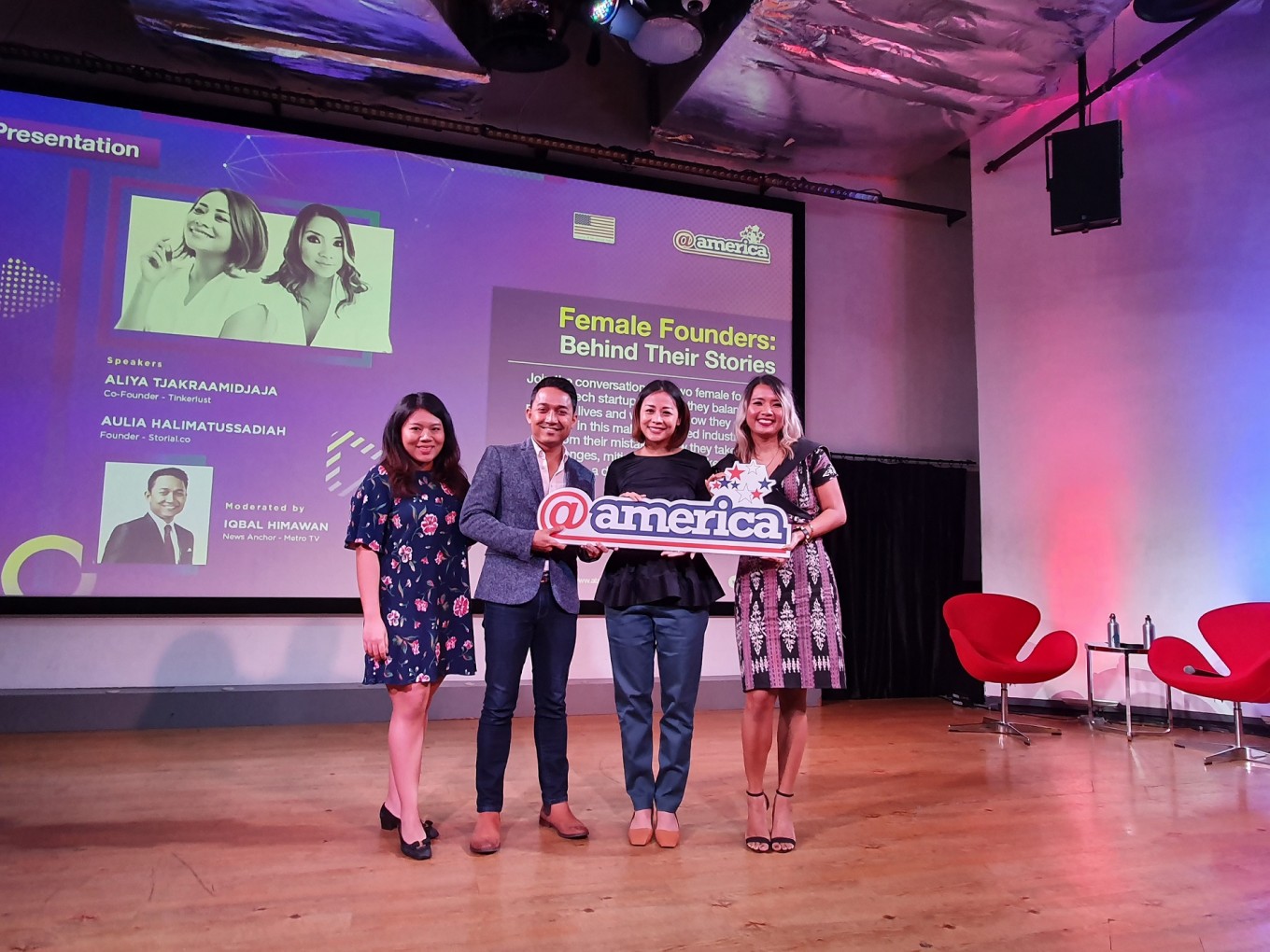Popular Reads
Top Results
Can't find what you're looking for?
View all search resultsPopular Reads
Top Results
Can't find what you're looking for?
View all search resultsFocus on Indonesia’s women business owners to unlock growth
Indonesia does better than only Malaysia and Myanmar in ASEAN according to the WEF assessment.
Change text size
Gift Premium Articles
to Anyone
 Raise the bar: Storial.co founder and CMO Aulia Halimatussadiah (far right) and Tinkerlust co-founder and COO Aliya Tjakraamidjaja (second right) pose with Metro TV news anchor Iqbal Himawan and Annisa Kurnia from Social Media Week 2019. at @america, Central Jakarta, on Nov. 12, 2019. (JP//Tertiani ZB Simanjuntak)
Raise the bar: Storial.co founder and CMO Aulia Halimatussadiah (far right) and Tinkerlust co-founder and COO Aliya Tjakraamidjaja (second right) pose with Metro TV news anchor Iqbal Himawan and Annisa Kurnia from Social Media Week 2019. at @america, Central Jakarta, on Nov. 12, 2019. (JP//Tertiani ZB Simanjuntak)
A
s Indonesia continues to confront the economic and health consequences of the ongoing COVID-19 pandemic, the nation can do more to leverage a critical untapped resource—the power of women business owners.
While gender-disaggregated data for small businesses is still to be fully collected, the World Bank has estimated that some 43 percent of entrepreneurs in Indonesia are women. And according to a 2016 joint report of the International Finance Corporation and USAID, women own almost half of the nation’s small and medium enterprises.
When it comes to gender parity, however, Indonesia ranks well behind several of its Southeast Asian neighbors. Of 153 assessed economies, Indonesia ranked just 85th, falling behind the Philippines (16th), Laos (43rd), Singapore (54th) and Thailand (75th) in the World Economic Forum's Global Gender Gap Index 2020 rankings. Vietnam (87th), Cambodia (89th), Brunei (95th), Malaysia (104th) and Myanmar (114th) fared even worse in the World Economic Forum rankings.
A closer look at the rankings also reveals that Indonesia fares particularly poorly when compared to its Southeast Asian neighbors on the WEF “economic participation and opportunity” for women subindex. Here, Indonesia does better than only Malaysia and Myanmar in ASEAN according to the WEF assessment.
Indonesia has much to gain by closing the nation’s gender gap in work and in society. Three ways to ensure women-owned businesses are a critical component of Indonesia’s post-pandemic growth story and to “building back better” are greater financial inclusion, increased digital access and an expansion of sourcing from women-owned suppliers.
The government’s National Women’s Financial Inclusion Strategy remains an important step forward, but implementation remains key. The strategy announced in June 2020 aims to close gaps that have hampered the growth of women-owned businesses, and in turn help them access markets, participate in value chains and become suppliers for government orders.
The strengths of digital Indonesia also can be leveraged to support the untapped resource of the nation’s women-owned businesses. Continued growth in e-commerce and the rise of billion dollar tech startups Bukalapak, Go-Jek, Tokopedia and Traveloka offer up both opportunities and challenges as the Indonesia business environment continues to evolve for women-owned micro, small and medium enterprises.
Indonesia also can benefit from lessons learned at home and abroad, as well as from initiatives of global organizations investing in women-owned businesses. One such effort is that of WEConnect International, a global network that connects women-owned businesses to qualified buyers around the world.
The Washington, DC-based, global non-profit organization’s mission is to help drive money into the hands of women business owners by enabling them to better compete in the global marketplace. A supporting consortium of international businesses, including Citibank, Dow and IBM, has in turn partnered with WEConnect International on supplier diversity and inclusion efforts to buy directly from Indonesian women-owned businesses.
By registering their businesses with the organization, Indonesian women-owned businesses, such as Aliet Green, Master Label and Pyramide Progress, strengthen their capacity to pitch and sell to large corporations. They also gain the opportunity to connect with domestic and international businesses seeking women suppliers to diversify their value chains and maximize their sourcing options.
In honor of International Women’s Day this month, WEConnect International issued a one-year “Rise to the Challenge” to its more than 110 global members to increase their sourcing from and spending on women-owned business suppliers.
According to WEConnect International CEO Elizabeth Vazquez, roughly 30 percent of all privately owned businesses worldwide are owned by women. Yet, women-owned businesses on average receive less than 1 percent of the supply chain spend from large multinational corporations and governments. The #Rise2TheChallenge goal is to increase that to at least 2 percent.
As with other environment, social and governance commitments, such public pledges to support women-owned businesses must also be quantified to ensure the reality of action follows the “ESG rhetoric.” Intel is the first global business to make its commitment public by announcing its new goal of spending $500 million annually with women-owned businesses by the end of 2025.
By increasing their spend, large, global corporations, as well as multilateral institutions and governments, could collectively have a multi-billion dollar impact on women-owned enterprises worldwide, including in Indonesia.
Just four years ago, professional services firms PricewaterhouseCoopers Global projected Indonesia would have the world’s fourth most powerful economy by 2050—only behind that of China, India and the United States. With economic growth and size, however, also comes rising expectations of a nation's drive toward gender parity.
If Indonesia invests in, empowers and yields the untapped benefits of all its women-owned businesses, it will be to the benefit of all the nation and a further example of how a more confident Indonesia can lead the way forward.
***
Curtis S. Chin, a former US ambassador to the Asian Development Bank, is managing director of advisory firm RiverPeak Group, LLC. Stacie Nevadomski Berdan, an award-winning author and advocate for women and international careers, is an advisor to WEConnect International.









